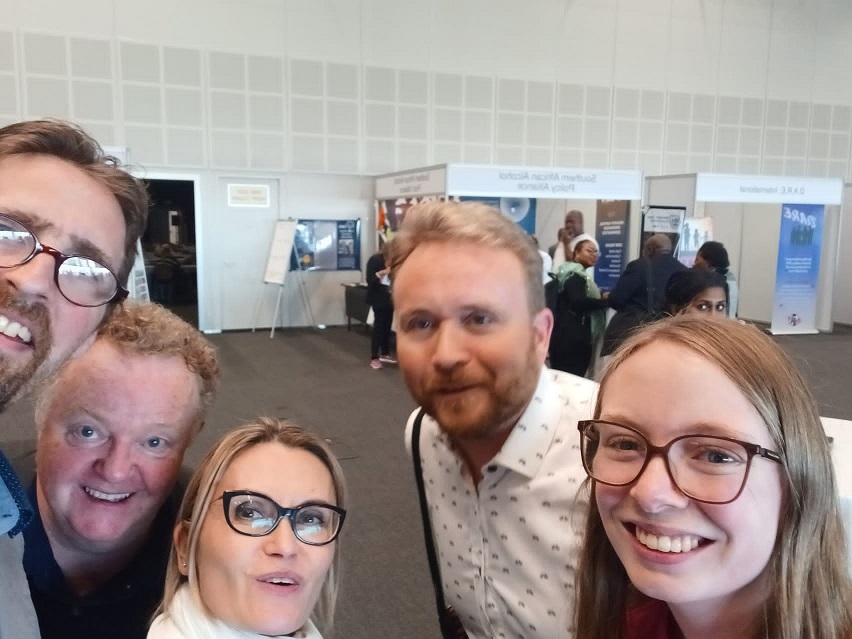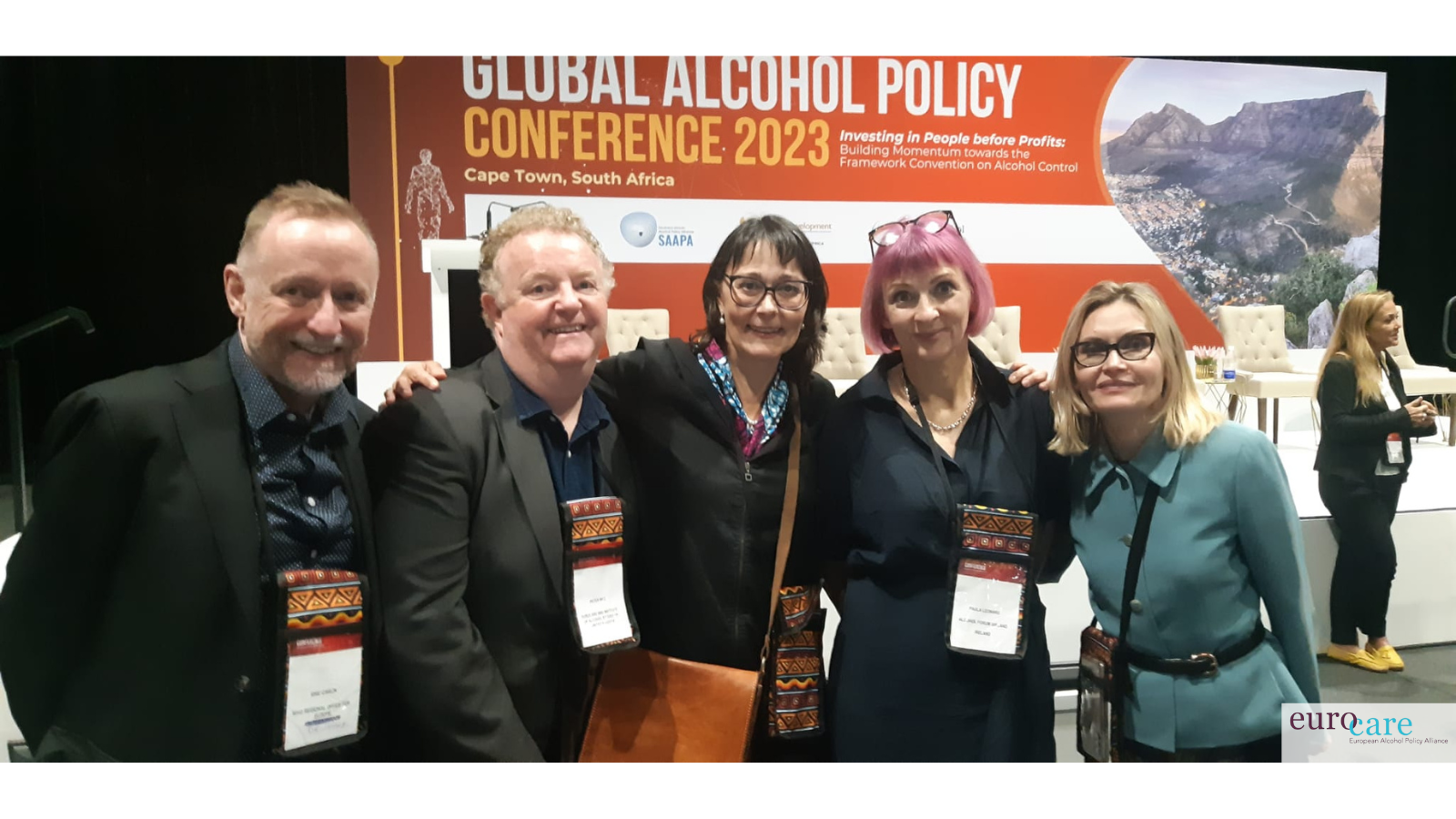Empowering Europe: Eurocare’s Impactful Contributions at GAPC 2023 Towards Health-Driven Alcohol Policies
Eric Carlin (WHO), Peter Rice (Eurocare President), Florence Berteletti (Eurocare S-G), Paula Leonard (CEO Alcohol Forum Ireland) & Cristina Padeanu (Eurocare Project and Operations Manager)
Navigating the Global Landscape
The 7th Global Alcohol Policy Conference (GAPC) was held in Cape Town, South Africa, on 24–26 October 2023. The Global Alcohol Policy Alliance (GAPA) is a network of non-governmental organisations and people working in public health who advocate for effective alcohol policies, free from commercial interests. GAPA is co-host of the Global Alcohol Policy Conference held every two years. The overarching theme of the conference was “Investing in people before profits: building momentum towards the Framework Convention on Alcohol Control”.
Despite a two-year delay caused by covid-19 the 7th conference was staged for the first time on the African continent. Over 500 delegates from 55 countries travelled often long distances to participate in three days of sessions across several rooms of the city’s imposing International Convention Centre. They took part in 7 plenaries, 28 concurrent sessions and 3 workshops. A total of 312 abstracts were submitted, resulting in 159 oral presentations and 89 posters.
Eurocare's Commitment: Prioritizing Nutrition Labels as the Cornerstone of EU Alcohol Policy
This event provided a unique opportunity for Eurocare’s staff, board, member organisations and wider personnel to learn from and inform peers, strengthening the global bonds essential to progress in EU alcohol policy. Above all, Eurocare’s presence ensured nutrition, ingredient labels are rightly seen as the highest alcohol policy priority at EU level.
Two members of Eurocare’s staff attended along with two board members and one consultant. Several of Eurocare’s 50 member organisations also sent their representatives, many of whom presented at the conference. Despite the long-distance travel, Europe had a big regional representation at the conference, which is appropriate given that the region has the world’s highest alcohol consumption, production, marketing, availability and, consequently, the highest alcohol harm.
Throughout the conference, Eurocare’s staff, board and consultants coordinated to ensure attendance at all the most relevant conference sessions. This included all seven plenary sessions–including an especially powerful presentation on alcohol and cancer risk by Beatrice Lauby-Secretan of IARC, the cancer research arm of WHO– as well as many the most relevant concurrent sessions.
A WHO-hosted side event titled “People before profits–protecting public health interests in alcohol policy” on October 23 provided a prelude to the main programme. At this side event Secretary General Florence Berteletti gave a presentation on conflicts of interest titled “Nothing new: Lessons from Tobacco”. It described the close parallels between alcohol and tobacco and what the public health community can learn from it. “All [health harming] industries use the same techniques and one of their favourite playgrounds is the EU,” the presentation concluded. The presentation explained in detail how insights learned from tobacco inform Eurocare’s policy advocacy on alcohol, especially in advocating for mandatory nutrition and ingredients labels on alcoholic products in the EU.
Eurocare’s advocacy for mandatory nutrition and ingredients labels is the highest priority at the EU level, playing a vital part in the global effort to curb alcohol harm. To be truly effective, however, tobacco has shown that the labels need to be well researched and tested, with a special focus on cancer risk, an effort Eurocare is leading.
Eurocare's Voice: Advocating for Change – From Advertising Bans to Taxation Strategies
Eurocare and its members actively participated in shaping the discourse at GAPC 2023, from championing advertising bans to navigating complex taxation strategies and highlighting the importance of addressing the Commercial Determinants of Health.
Stig Erik Sørheim, a Eurocare board member, provided a detailed look at the gold standard advertising law in his country. Norway’s advertising ban includes a ban on common loopholes like alibi marketing and online marketing, said Sørheim, head of the International Department of Actis, the Norwegian Policy Network on Alcohol and Drugs. Some online advertising is making its way past the law, due to gaps in enforcement. But, 50 years on, Norway’s comprehensive advertising ban continues to enjoy strong support and has withstood persistent challenges from the alcohol industry.
Lithuania is looking to follow Norway’s example on advertising. Dr Mindaugas Štelemėkas, Senior Researcher at Lithuanian University of Health Sciences, Kauns, Lithuania, offered the conference floor detailed insight into the country’s success in implementing a total alcohol advertising ban.
“The alcohol industry’s partnerships with public bodies in Portugal undermines public support for effective policies,” said Dr Valente of Eurocare member CATR, summarising the conclusions of her groundbreaking research in Portugal. “The conflict of interest needs to be monitored and questioned, if not regulated.”
Eurocare’s President Dr Peter Rice, who also chairs the UK’s Institute of Alcohol Studies, a Eurocare member, dug deeper into alcohol tax, offering some of the lessons learned participating in the UK’s alcohol review process. Among them is that health is not typically a major consideration in tax policy, with finance departments well versed in the health arguments. Engaging economic think-tanks proved to be a useful way to counter this, helping to frame the health issues for finance ministries. Finance ministries’ liking for keeping flexibility proved to be a barrier. “Automatic tax uprating mechanisms are hard to achieve,” said Dr Rice, making increasing affordability an ongoing battle.

Phil Cain (Eurocare Senior Communication Advisor), Peter Rice (Eurocare President), Cristina Padeanu (Eurocare Project and Operations Manager), Stig Erik Sørheim (Head International Department of Actis), Mai Lene Fløysvik Hæåk (Political advisor at Actis)
Networking for Progress: Strengthening Global Bonds in the Pursuit of Health over Profit
The GAPC conference and its WHO side event gave Eurocare and its wider network a chance to share its expertise and aims with its peers, while also learning how it contributes to the wider global efforts to prioritise people’s interests over commercial interests.
"GAPC 2023 in Cape Town was a great opportunity to catch up with colleagues with similar interests from all over the world,” said Eurocare President Dr Peter Rice. “There are many similarities in what we are trying to achieve but [there are] different contexts in different places for making progress. There was a lot of discussion on the Commercial Determinants of Health, and in Europe, our situation is influenced by the presence of many major alcohol industry HQs in Western Europe and the influence that has on policy making.”
“It is hard to network, especially as a newbie, but it pays off!” said Dr Francisca Valente, an early career advocate from Eurocare member organisation CATR, who received partial financial support from the organisers to attend. “I got to see many of the people I admire and had some amazing interactions there. It might only take one aha moment to change your life or career path.” Among Dr Valente’s biggest takeaways was that “We should use, defend, and advocate for the WHO European Framework for action on alcohol 2022-2025.” She played her part in doing so by presenting her original research on conflicts of interest in Portugal (detailed below).
Conference Outcomes: Unveiling the GAPC 2023 Declaration – A Call for Action in Europe and Beyond
An important outcome of this meeting is the final declaration, adopted by acclamation by all delegates at the end of the event. “The Conference Declaration drew attention to the barriers which alcohol represents to the UN's Sustainable Development Goals, the need for better response from governments to industry conflicts of interest and called for WHO to study the feasibility of a legally binding instrument to strengthen the response to alcohol related harm. Eurocare supported this call," Eurocare President Dr Peter Rice said, referring to the Declaration drafted by Professor David Jernigan of the Boston University School of Public Health.
The Declaration clearly calls for “national governments to recognise the alcohol industry’s conflict of interest with effective alcohol policies, and establish clear rules separating the industry from engagement with policy development.” Eurocare fully supports this call, while also extending the call to the EU institutions and to other supranational bodies, such as the WHO.

